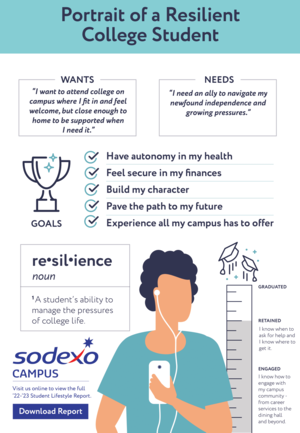The Resilient Student: Developing a Skill for Lifelong Success
Working well on a team, thinking critically and focusing on details are all important skills that students learn while in college. Honing these skills will help them succeed in their careers and in their lives. But there is something even more vital to ensuring students’ success and well-being, and it’s something colleges can actively help students cultivate: resilience.
Life is full of setbacks, both professional and personal. At some point, we all face unexpected obstacles. The last few years have shown us a great example of that, but even individual events in students’ personal lives can cause unforeseen disruptions and create a need for resilience. From family issues to health concerns and financial challenges to logistical considerations, life sometimes forces us to reconsider our carefully laid plans. Students have certainly felt the weight of recent events, with many altering their decisions related to higher education or career interests. They have also been impacted by the changes to their social lives, with many students expressing a sense of loneliness and isolation. In fact, Sodexo’s 2022-2023 Student Lifestyle Survey revealed that more than 60% of today’s students report having felt overwhelmed and anxious during their time at school. Encouraging resiliency is essential to helping students learn to manage the ups and downs they will certainly continue to experience throughout their lives.
Why Resilience Matters
A resilient person can recover from setbacks and adjust to changing conditions, even when things are less than ideal. Rather than adopting an attitude of defeat when facing unexpected challenges, resilient students approach problems with a positive mindset and confidence that they can handle the situation.
Resilience is especially crucial during times of transitions. A new job, a new school, a new city, a new phase in life — each of these milestones can feel stressful and overwhelming. A sense of resiliency helps individuals navigate these complex and challenging events with greater ease, maintaining their mental and emotional well-being along the way.
There are also key benefits to cultivating resilience. According to Harvard Medical School, those who are resilient tend to live longer, suffer from depression less frequently and enjoy greater satisfaction with life. Conversely, a lack of resilience can contribute to chronic stress and a host of negative impacts to physical and mental health.
Helping Students Become More Resilient
Educators have a responsibility to help students develop and maintain resiliency. It can be tricky, though, as it requires striking a balance between giving students the tools and guidance they need to become self-sufficient and offering the right level of support along the way. The Student Lifestyle Survey revealed key insights around the major components of resiliency.
The Four Components of Student Resiliency
Mental Health
A strong mental health foundation is key to developing resiliency. Unfortunately, many students currently struggle in this area. Among the one-third of students who have considered dropping out, 60% cite health and mental health problems as their top reason.
Physical Health
Roughly half of students are concerned about the state of their personal health and well-being. Despite this, they struggle to make healthy choices, with fewer students prioritizing healthy eating and regular exercise today than in 2020.
Social Success
Only 55% of students surveyed in 2022 are satisfied with their current social lives — a significant drop since 2020. More than half of students surveyed report feeling lonely, making it essential to offer ample opportunities to form and strengthen social connections on campus.
Financial Security
Finances are a major source of stress, with four out of five students reporting that they are concerned about money. For 81% of students, affordability is the top factor in choosing a college. As costs continue increasing, perceptions regarding the value of higher education are shifting.
 Working Together to Create Resilient Students
Working Together to Create Resilient Students
Resilience is key for a productive and meaningful life. It applies to countless situations and benefits students at every stage in their journey. As a mother, I understand how tempting it can be to step in and address problems for our children, but helping them develop resilience provides long-term benefits and fosters growth and independence. Encouraging a sense of resilience in my own kids reminds me what an essential role higher education — and campus partners like Sodexo — can play.
For example, campus dining is a top driver of social engagement, with 87% of students reporting that eating together is the most typical way that they socialize with friends. Students on meal plans are a great example of the positive social impact of dining on campus with peers, as they are nearly two times more engaged with the campus community.
As we deepen our understanding of students’ evolving needs, Sodexo will continue working with our partner campuses to provide the tools, programs and services that will help students thrive.